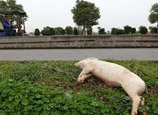
This is evidenced in the fact that exports expanded by just 6.2 percent last year, he added.
The General Administration of Customs surveyed 2,000 export companies in the latter part of 2012. It found that 50 percent said orders decreased, and 70 percent said overall production costs had risen from the first half of the year.
Zhang Xiaoji, an economist with the Development Research Center of the State Council, said the cost factor at the core of China's export competitiveness was falling further, and companies need to create new competitive edges through technology, equipment and marketing.
China's foreign trade will continue to struggle in 2013, with sluggish overseas demand, currency quantitative easing and trade protectionism all posing barriers, the Ministry of Commerce has cautioned.
Cai Hongbin warned that exports could fall if companies fail to raise their competitiveness in technology and innovation and produce goods with higher added value.
The Commerce Ministry has set fostering new competitive edges as a priority. Specific measures include the internationalization of strategic emerging industries, the establishment of overseas sales networks and support for companies in building brands and R&D centers.
In coastal Jiangsu Province, an export base, efforts to create new competitive edges have paid off for some companies. Clothing orders that had gone to Southeast Asian countries offering lower production costs have returned because Chinese workers surpassed their Southeast Asian counterparts in skill and work standards.
At a recent press conference, Li Yining, a distinguished economist, said China should speed up industrial upgrading to sell higher-quality goods, as well as quicken economic restructuring at home to manage the threat posed to China's exports by the devaluation of foreign currencies.
China's economy is currently re-balancing, with plans to shift from relying on trade and investment to domestic consumption to drive growth.
Nevertheless, trade will remain important for China's economy.
Last year, Commerce Minister Chen said over 80 million workers were employed in China's foreign trade sector, and over 60 percent of them were from rural areas. Stable exports are essential to supporting growth and employment, as well as balancing urban-rural development and sustaining domestic consumption.
Still, Li Qingyun, an economist with Peking University, held that China should no longer pursue overly high export targets, adding that a large trade surplus will not help China's efforts to drive domestic consumption.

















 Year's first rainfall for Beijing
Year's first rainfall for Beijing


![]()
